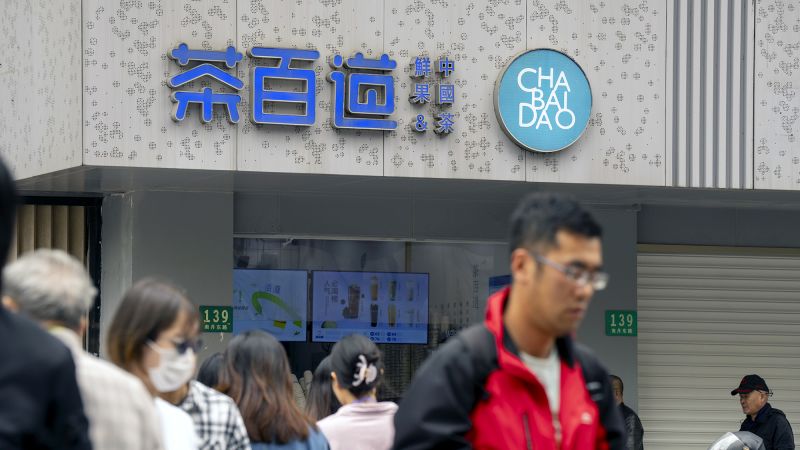Summarize this content to 2000 words in 6 paragraphs
Shares in Chinese bubble tea chain Sichuan Baicha Baidao failed to pop during their market debut Tuesday, tumbling as much as 38% from their listing price.
The company, also known as Chabaidao or ChaPanda, had priced its shares at $17.50 Hong Kong dollars ($2.23) apiece, but they plunged as low as $10.80 Hong Kong dollars ($1.38) in the first two hours of trading on the Hong Kong stock exchange.
ChaPanda’s shares closed nearly 27% down at $12.80 Hong Kong dollars ($1.63).
The company is China’s third-largest retailer of freshly made tea drinks, it said in its IPO prospectus, citing data from market research consultancy Frost & Sullivan. It operates mainly via franchises and has established a network of more than 8,000 stores since opening its first in Chengdu, Sichuan, in 2008.
It said it intended to use the money raised from the listing to strengthen its supply chain and digitize its operations, among other plans.
Bubble tea (also called “black pearl tea” or “boba tea”) originated in Taiwan in the 1980s, but has since found millions of devotees around the world. Though there are dozens of variations, the essential ingredients are tea, milk and bubbles — little balls made of anything from tapioca to fruit jelly.
The drink is hugely popular in China: In 2023, the industry was estimated to be worth 145 billion yuan ($20 billion), according to a report by the China Chain Store & Franchise Association.
The plunge in ChaPanda’s shares marks a disappointing turn for the chain, which raised more than $330 million from investors in its IPO, making it Hong Kong’s largest market debut so far in 2024, according to data from Dealogic.
It may also be a warning shot to other bubble tea makers preparing to go public amid a difficult time for Chinese stocks. In January, two of China’s most popular bubble tea brands, Mixue Group and Guming Holdings, applied for IPOs on Hong Kong’s stock exchange.
Another Chinese bubble tea maker, Nayuki, has lost 88% of its stock market value since going public in Hong Kong in 2021.
China’s stock market has struggled in recent years as a litany of economic challenges — including a real estate crisis and high youth unemployment — have spooked investors. The malaise prompted Chinese officials to announce measures to boost investors’ confidence earlier this year.
Hong Kong’s benchmark Hang Seng index lost almost 14% of its value last year, and is down 1.3% so far in 2024. China’s blue-chip CSI 300 index, comprising 300 major stocks listed in Shanghai and Shenzhen, fell 11.4% over 2023, though it has notched a 2.2% gain so far this year.
Robert Lui, a capital markets analyst at Deloitte, said Hong Kong’s IPO market was “slow” during the first quarter of this year.
“The overall turnover and valuation of the (Hong Kong) stock market, which depend on the market liquidity, i.e. funds, remained low,” he wrote in a report earlier this month.
Laura He contributed reporting.













